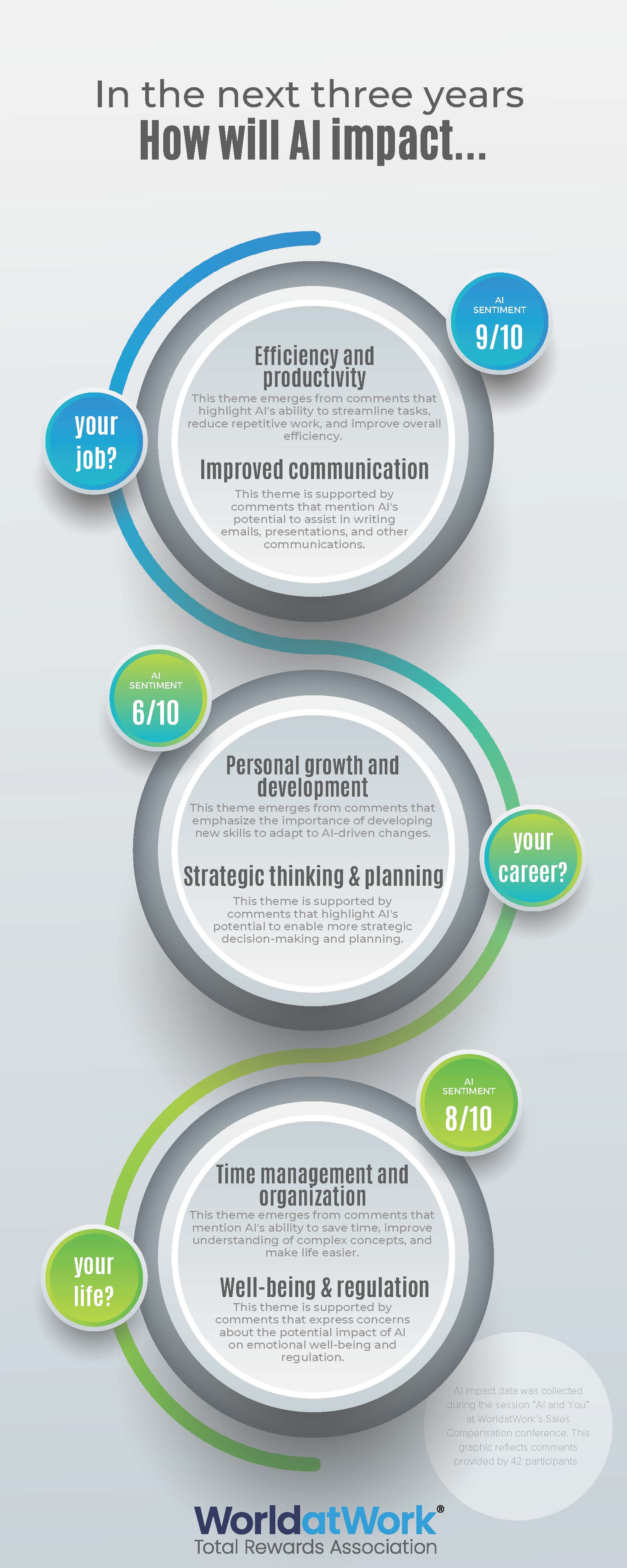- Artificial intelligence impacts sales compensation. AI can transform who is selling a product, who it’s being sold to and sale cycles, which could significantly impact incentives and comp structures.
- Buyer beware. Despite the innovations AI can bring, deceptive uses (e.g., deepfakes) introduce risks.
- Sales pros must learn new skills. Management will be an important skill to learn as AI will need to be supervised.
Deepfakes. Clones. Artificial intelligence (AI) agents.
Those topics were front and center — not at a science-fiction convention but at WorldatWork’s Sales Comp’24 conference in San Francisco. During Monday’s opening main-stage session, “AI-Driven Business Transformation: Powering the Future Today,” Sam Jordan (pictured above), a futurist and consultant at Future Today Institute, spoke to an audience of compensation leaders about how they can make decisions today to prepare for tomorrow’s business landscape as AI continues to evolve and impact organizations.
Read: 3 Sales Compensation Challenges that AI Can Help Tackle
From a sales process perspective, Jordan said AI can transform who is selling a product, who it’s being sold to and sale cycles, which could significantly impact incentives and compensation structures.
“AI is developing the ability to reason,” Jordan said. “It can think fast and slow just like a human. It’s starting to think the way we think.”
Due to the pace of AI growth, Jordan said the technology may soon be used to create “clones” to act like virtual avatars. “These agents can interact with customers, find potential clients and engage with clients early on in the sales process,” she explained. “There are also companies that can create AI clones of yourself.”
As a visual example of the latter, Jordan showed the audience a deepfake video of her speaking Japanese in her own voice. The twist is that, in reality, Jordan can’t speak Japanese.
“Imagine how this tech can be used with international teams and clients,” she said.
Sales comp leaders should also consider how these AI clones and agents may alter compensation. “How would you compensate someone for using their likeness?” Jordan asked the audience. Or, perhaps it’s not the salespeople, but the IT professionals and engineers who make these AI roles possible who should get compensated, she said.
Despite the innovations AI can bring, Jordan cautioned the event attendees about the possible deception attributed to the technology. For example, deepfakes are not just being made about individuals, but also organizations and entities. The technology can also create deepfakes about events, scenes and company announcements that didn’t happen.

Automation of Work
With reports indicating more jobs will be replaced by AI, Jordan said it was better for employees to focus on the skills they must build now to become resilient.
“The number one skill that will be important is management,” she said. “AI will be designed to work on complex tasks, to seek feedback, to build comprehensive strategies much like humans do. ... For AI to do all of this effectively, it will need a good supervisor.”
Over the next decade, Jordan predicted sales teams will become “weird,” with a mix of humans and AI agents working together.
But before employers start implementing AI, they should first examine their organizational culture and ask, “Will the use of this technology help employees self-actualize or neuter them?” she said.
Jordan also presented the audience with two scenarios:
- A pessimistic one, where an employee let an AI clone do all the work, turning it into a bad actor and ruining relationships with clients; and
- An optimistic one, where an employee with management skills was able to clearly communicate and collaborate with its AI clone and help troubleshoot any issues.
“Writing optimistic scenarios is actually much more important than writing pessimistic scenarios because, while it’s important to have something to run from, it’s more important to have something to run toward,” Jordan said.
In both scenarios, there are certain elements that likely won’t change, she said:
- Incentives will continue to matter (for both humans and AI agents).
- Relationship-building will become more important.
- Interests from different parties within the organization will conflict.
“Whether we have the optimistic version or the pessimistic version of the future, ultimately, it depends on how we react,” Jordan said.
Editor’s Note: Additional Content
For more information and resources related to this article, see the pages below, which offer quick access to all WorldatWork content on these topics:








